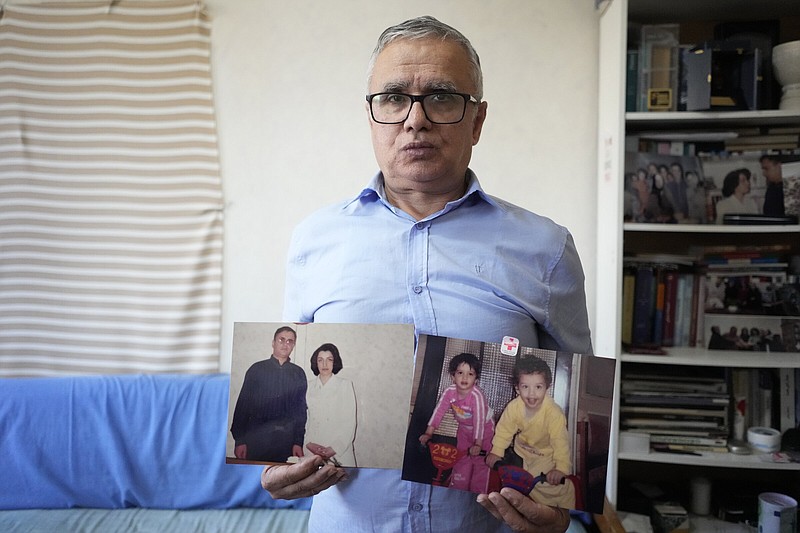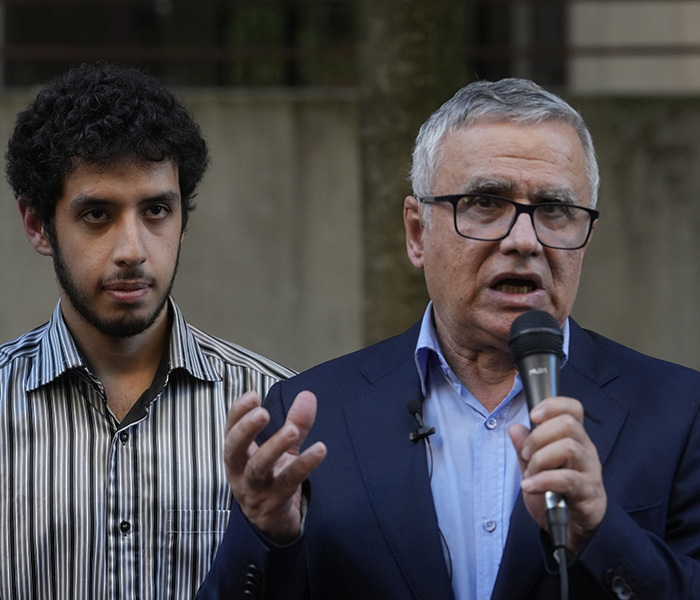Imprisoned Iranian activist Narges Mohammadi won the Nobel Peace Prize on Friday in recognition of her tireless campaigning for women's rights and democracy and against the death penalty.
Mohammadi, 51, has kept up her activism despite numerous arrests by Iranian authorities and spending years behind bars. She has remained a leading light for nationwide, women-led protests sparked by the death last year of a 22-year-old woman in police custody that have grown into one of the most intense challenges to Iran's theocratic government.
Berit Reiss-Andersen, the chair of the Norwegian Nobel Committee, began Friday's announcement with the words "Woman, Life, Freedom" in Farsi -- the slogan of the demonstrations in Iran.
"This prize is first and foremost a recognition of the very important work of a whole movement in Iran with its undisputed leader, Narges Mohammadi," Reiss-Andersen said. She also urged Iran to release Mohammadi in time for the Dec. 10 prize ceremony.
In a statement released after the Nobel announcement, Mohammadi said she will "never stop striving for the realization of democracy, freedom and equality."
"Surely the Nobel Peace Prize will make me more resilient, determined, hopeful and enthusiastic on this path, and it will accelerate my pace," she said in the statement.
She also called for fellow protesters to persevere.
"Standing alongside the brave mothers of Iran," she said, "I will continue to fight against the relentless discrimination, tyranny and gender-based oppression by the oppressive religious government until the liberation of women.
"I also hope this recognition makes Iranians protesting for change stronger and more organized. Victory is near."
Mohammadi has been imprisoned 13 times and convicted five. In total, she has been sentenced to 31 years in prison. Her most recent incarceration, from which stemmed a 10-year prison sentence, began when she was detained in 2021 after attending a memorial for a person killed in nationwide protests.
She has been held at Tehran's Evin prison, whose inmates include those with Western ties and political prisoners.
U.S. President Joe Biden and Amnesty International joined calls for Mohammadi's immediate release.
"This award is a recognition that even as she is currently and unjustly held in Evin prison, the world still hears the clarion voice of Narges Mohammadi calling for freedom and equality," Biden said in a statement. "I urge the government in Iran to immediately release her and her fellow gender-equality advocates from captivity."
Mohammadi's brother, Hamidreza Mohammadi, said that while "the prize means that the world has seen this movement," it will not affect the situation in Iran.
"The regime will double down on the opposition," he told The Associated Press. "They will just crush people."
Mohammadi's husband, Taghi Rahmani, who lives in exile in Paris with their 16-year-old twins, said his wife "has a sentence she always repeats: 'Every single award will make me more intrepid, more resilient and more brave for realizing human rights, freedom, civil equality and democracy.'"
Rahmani hasn't been able to see his wife for 11 years, and their children haven't seen their mother for seven, he said. Their son, Ali Rahmani, said he learned about the prize while he was in school Friday by checking his phone under his desk.
"I couldn't shout in class, but I was so happy," he said at the family's apartment. "We are afraid for my mom every day. The Nobel Prize is a sign for her to continue straight on, to not abandon the fight."
Rahmani said his daughter, Kiana, told him, "I just want my mama; I want her back with us."
It's the fifth time in its 122-year history that the Nobel Peace Prize has been given to someone in prison or under house arrest. Last year, the top human rights advocate in Belarus, Ales Bialiatski, was among the winners. He remains imprisoned.
Mohammadi was in detention for the recent protests over the death of Mahsa Amini, who was picked up by the morality police for her allegedly loose headscarf. More than 500 people were killed in a security crackdown, while over 22,000 others were arrested.
From behind bars, Mohammadi wrote an opinion piece for The New York Times last month. "What the government may not understand is that the more of us they lock up, the stronger we become," she wrote.
In the first reaction from Tehran, the semi-official Fars news agency dismissed Mohammadi as someone who "persisted in creating tension and unrest and falsely claimed that she was beaten in prison." Other state-affiliated media and analysts close to the government dismissed the prize, calling it a Western plot to stir further unrest.
In Tehran, people expressed support for Mohammadi and her resilience.
"The prize was her right. She stayed inside the country, in prison and defended people, bravo!" said Mina Gilani, a girl's high school teacher.
Mohammadi was born in the central Iranian city of Zanjan to a middle-class family. Her path to activism began with two childhood memories: her mother stuffing a red plastic shopping basket with fruit every week for prison visits with Mohammadi's uncle and her mother sitting on the floor near the television to hear the names of prisoners executed each day.
She studied physics in college, where she quickly became involved in activism, founding a women's hiking group and another focused on civic engagement. She also met Rahmani, a well-known figure in Iran's intellectual circles, while attending an underground class he taught on civil society. She moved to Tehran after graduation and began a career as a civil engineer and human rights activist.
The government forced her employer to fire her in 2008 and barred her from working in engineering.
Mohammadi is the author of "White Torture," a book that documents through interviews the psychological torture and abuse of prisoners in Iran. This year, she won PEN America's Barbey Freedom to Write Award. The United Nations also named her one of the three recipients of its World Press Freedom Prize.
Information for this article was contributed by Jon Gambrell, John Leicester, Elena Becatoros, Mike Corder, Nicolas Garriga and Jan M. Olsen of The Associated Press; and by Farnaz Fassihi of The New York Times.


